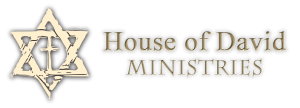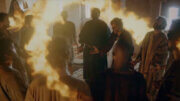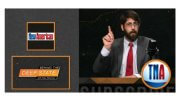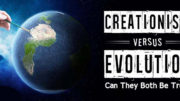Dear brothers and sisters in Christ, Yeshua:
“In the beginning, God created the heavens and the earth” (Genesis 1:1, NKJV).[i]
The first word in Hebrew is Be-reisheet. This word signifies the very act of creation—God brought “being” into existence from “non-being,” something from nothing.[ii]
In the beginning (Be-reisheet), the Lord God-YHVH[iii] made all things perfect. Each living organism on earth divinely planned and woven into the most remarkable fabric of creation, a living tapestry of God’s artwork. Every detail carefully and methodically executed by the wisdom of God, for a creation without wisdom, would be chaos.
But the universe is far from that. It is intelligently designed by God’s hand. Each star and speck of dust moved into place, every planet in our solar system carefully aligned, and the earth itself delicately cloaked in a firmament of water and oxygen, a biosphere capable of sustaining all life.
The creation started with God’s wisdom, which our sages also call “the beginning.” “O LORD, how manifold are Your works! In wisdom You have made them all” (Psalm 104:24). So, let us revisit Genesis 1:1, with emphasis added:
“With the beginning (Be-reisheet), God’s wisdom created the heavens and the earth.”
Through the creation, God’s wisdom has revealed His unbound will and knowledge. “The LORD by wisdom founded the earth; By understanding He established the heavens” (Proverbs 3:19). And because God’s wisdom has eternally existed with Him, the creation itself, in a spiritual sense, has also eternally existing with God, but it was void and without form.[iv]
Another way to look at it. The creation existed in God’s thought, and God’s thought would lead to His act of creation. This action would emanate as wisdom, the source of the laws of creation; one of these laws is “time.” And, in His appointed time, God would bring the creation into physical existence.
Even the Son of God, who is the source of all life, has eternally existed with the Father. As it is written: “He [Christ] was in the beginning with God” (John 1:2). And in God’s time, Christ would emanate in this natural world, as it says: “But when the fullness of the time had come, God sent forth His Son, born of a woman” (Galatians 4:4). Let us explore this more deeply.
Rabbi Hoshayah the Great opened his Midrashic discourse on Genesis 1:1 with a prooftext, a petihta from Proverbs, “Then I was beside Him as a master craftsman; And I was daily His delight, Rejoicing always before Him” (Proverbs 8:30). Here, the Torah describes its relationship with God even before the advent of creation. For a full explanation of Midrash, see our teaching on Understanding Midrash.[v]
The first line of this proverb translates from a more-simple Hebrew sentence structure: va-eheyeh etsmo amon (וָאֶהְיֶה אֶצְלוֹ אָמוֹן) and means “I was then His amon.” The word amon is interpreted by the Sages to mean hidden, covered, great in significance, nurse or nursling, and master craftsman as similarly used here in the New King James. Ultimately, we will see that all these interpretations point to Yeshua.
The word reisheet (beginning), is a reference to nothing other than the Torah. “The Lord possessed me at the beginning of His way…” (Proverbs 8:22). Whenever we refer to the Torah, we are speaking of the written word. But the New Testament tells us that “the Word became flesh and dwelt among us…” (John 1:14).
The word amon can be interpreted to mean “hidden” or “great in significance.” In the words of the sages, it says, “For [only][vi] ‘God understands its way [the way of the Torah], and knows its station’ and quality through His self-knowledge,[vii] as it were; knowing Himself, he also knows the Torah that is entirely one with Him.
This, however, is[viii] ‘concealed from all mortal eyes.’ As it is written,[ix] ‘My Face — i.e., the innermost dimension of the Torah, its pnimiyut [inwardness], as implied by the word panim [face or front, i.e., countenance]—shall not be seen,’ as is explained there[x] in the name of the AriZal.” [xi] [xii]
These mysteries hidden in the narrative of the Torah all point to Yeshua, the Son of God. He is the only one who is great in significance. “[Oh] the unsearchable riches of Christ…to make all see what is the fellowship of the mystery, which from the beginning of the ages has been hidden in God who created all things through Jesus Christ…” (Ephesians 3:8-9). “Nor is there salvation in any other, for there is no other name under heaven given among men by which we must be saved” (Acts 4:12). “Therefore God also has highly exalted Him and given Him the name which is above every name” (Philippians 2:9).
The word amon can be interpreted to mean “covered.” The Sages use Lamentations 4:5 as a petihta for this interpretation, “Those who were brought up [i.e., covered] in scarlet [sin]…” Scripture tells us that we have all been brought forth in iniquity.[xiii] Unknowingly, the Sages are prophetically speaking of Yeshua, the one who is covered in scarlet.
Scarlet is the color of sin and the color of atonement He made through the shedding of His blood.[xiv] As it is written, “And the Lord has laid on Him the iniquity of us all” (Isaiah 53:6). “For He made Him who knew no sin to be sin for us…” (2Corinthians 5:21). Yeshua became our sin, and to those who are in Christ, it is as though we had never sinned.
In the words of the sages, it says, “Concerning this [innermost level of the Torah] it is written,[xv] “I was by Him amon (‘one who is nurtured’),” [and the Midrash comments],[xvi] “Do not read amon, but uman (‘one who nurtures’).”[xvii] Therefore, the word amon can be interpreted by its relationship to the word omen, which means “nurse” or “nursling.” Therefore, the Torah is saying, “I was then His nursling.”
Yeshua was born into this world, physically nursed by his earthly mother and spiritually nursed by His heavenly Father. “Blessed is the womb that bore You, and the breasts which nursed You!” (Luke 11:27). “For He shall grow up before Him as a tender plant [nursling], And as a root out of dry ground…” (Isaiah 53:2). “And the Child grew and became strong in spirit, filled with wisdom; and the grace of God was upon Him.” (Luke 2:40).
Yeshua is also the great healer—the great nurse and the one who nurtures. And He has promised to gather, restore, and heal the remnant of the House of Israel. “Did I conceive all these people? Did I beget them, that You should say to me, ‘Carry them in your bosom, as a guardian carries a nursing child,’ to the land which You swore to their fathers?” (Numbers 11:12). “Lift up your eyes all around, and see: They all gather together, they come to you; Your sons shall come from afar, And your daughters shall be nursed at your side” (Isaiah 60:40).
The word amon is to be further understood in the sense of uman, a “master craftsman.” Thus, the verse in the Torah declares, “I was the craftsman’s tool in the hands of the Holy One, blessed is He, through which He created the world.” The Midrash explains this concept using a parable:
“In the usual practice of the world, when a king of flesh and blood builds a palace, he does not construct it based on his knowledge but based on the knowledge of a craftsman. And the craftsman likewise does not construct it based on his knowledge; rather, he has papers and diagrams from which to know how to make the rooms and how to make the wicket doors. So too did the Holy One, blessed is He, peer into the Torah and thus created the world.”[xviii]
Again, the word reisheet is a reference to the Torah. Hence our parable is saying that with the Torah, i.e., with Yeshua—the word made flesh as His tool—God created the heavens and the earth. The apostle John states this clearly when he says, “All things were made through Him, and without Him nothing was made that was made” (John 1:3).
How are we to see Yeshua? He is the master craftsman, the carpenter whom the Father sent forth to build the living tabernacle of God. Yeshua only did what He saw the Father doing.[xix] Therefore, He is precisely building this tabernacle according to the blueprint His Father has given Him.[xx] And what is this blueprint?
“Then God said, Let Us make man in Our image, according to Our likeness…” (Genesis 1:26). We were made in the image of God, who is Spirit and placed in a physical body to have dominion over His creation. Apart from the angels, it was always God’s desire to dwell with men. “Behold, the tabernacle of God is among men, and He will dwell among them, and they shall be His people, and God Himself will be among them” (Revelation 21:3).
The word amon contains the root letters for the word Amen, implying “let it be so,” and according to the Talmud, it is related to the word amanah, meaning truthfulness, credence, or belief.[xxi] Therefore, Amen is an affirmation that we believe what God has spoken and a confirmation that He will bring His word to completion.
The pinnacle of God’s workmanship was man, a being of both physical and spiritual nature, which, in every aspect, was created in the perfect image of God Himself. Our bodies made from the dust of the universe, while our inner being, the core of who we truly are, is that breath of life that came directly from God.[xxii]
In so, we are not merely copies of the creator but are a part of Him. Now in Christ, we have become a new creation in Him and are eagerly awaiting our new body that is incorruptible and without sin.[xxiii]
All of creation was made for man, a garden of exploration that would captivate our imagination, a world that would continually move us to stand in awe of our creator. And so, God made us the caretakers of His creation, to have dominion over His earthly kingdom with the same delicacy and reverence as our creator.
“This, in fact, is the whole purpose of man, and the purpose for which he, and all the worlds, both upper and lower, were created: that God should have such a dwelling-place here below — how this earthly abode for God is the purpose of all creation.”[xxiv]
Amen!
SOURCE: HOUSE OF DAVID MINISTRIES
[i] All Scripture quotations are taken from the New King James Bible (NKJV) unless otherwise noted, Thomas Nelson Inc., 1982.
[ii] Glotzer, Leonard R. The Fundamentals of Jewish Mysticism: The Book of Creation and Its Commentaries. Jason Aronson, Inc.
[iii] YHVH (יְהוָה) is His personal name, and we must read His word from that place of intimacy. Using the words God and Lord are generic and: (a) do not speak to His sovereignty and authority, (b) neglect the attributes of His character that are attached to His name, and (c) leave us speaking to or hearing about God rather than speaking to or hearing from God.
[iv] Genesis 1:2.
[v] Peters, Mimi. Learning to read Midrash. Urim Publications, ISBN 965-7108-57-8.
[vi] Cf. Iyov 28:23.
[vii] Rambam, Hilchot Yesodei HaTorah 2:10.
[viii] Iyov 28:21.
[ix] Shmot 30:23.
[x] Note of the Rebbe: “See Iggeret HaKodesh, Epistle XIX.”
[xi] The most famous Kabbalist of the day, Rabbi Isaac Luria (1534-1572), universally known as the Arizal, an acronym for “The G‑dly Rabbi Isaac of Blessed Memory.” Chabad.org.
[xii] The Tanya of Rabbi Schneur Zalman of Liadi, elucidated by Rabbi Yosef Wineberg—Kuntres Acharon, end of Essay 6, December 15, 2016. Translated from Yiddish by Rabbi Levy Wineberg and Rabbi Sholom B. Wineberg. Edited by Uri Kaploun. Published and copyrighted by Kehot Publication Society. Chabad. Org.
[xiii] Psalm 51:5.
[xiv] Numbers 19:6, Isaiah 1:18.
[xv] Mishlei 8:30.
[xvi] Beginning of Bereishit Rabbah.
[xvii] Ibid. Kuntres Acharon, end of Essay 6.
[xviii] Kleinman Ed Midrash Rabbah: Vayikra Vol 1 Parshiyos Vayikra—Metzora.
[xix] John 5:19.
[xx] John 6:44, 1Peter 2:5.
[xxi] Posner, Eliezer. Where does the term “Amen” come from? Chabad.org.
[xxii] Genesis 2:7.
[xxiii] 1Corinthians 15:42.
[xxiv] Chabad.org. Lessons in the Tanya, Likutei Amarim, Chapter 33. March 9, 2016.






